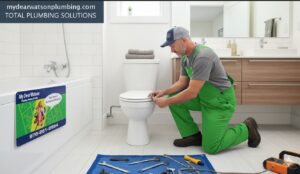The Top 10 Qualities You Need to Be a Great Plumber
Plumbing is an essential and often overlooked aspect of our daily lives.
Without it, we wouldn’t have access to clean water, functioning toilets, or showers.
While it may not be the most glamorous profession, it is certainly one of the most important.
But what does it take to be a great plumber?
In this blog post, we’ll be exploring the top 7 qualities that every plumber should possess.
From technical know-how to interpersonal skills, a great plumber needs a diverse skill set to succeed.
In addition to the more obvious qualities such as problem-solving skills and attention to detail, a great plumber should also be a good communicator, able to explain complex concepts to clients in a way that they can understand.
They should be able to work well under pressure and be willing to work long hours to get the job done.
Whether you’re a seasoned plumber or just starting out in the industry, this article will provide valuable insights into what it takes to be a great plumber and how to excel in the profession
1. Expertise in plumbing techniques.
To be a great plumber, one of the top qualities you need is expertise in plumbing techniques.
This includes everything from knowledge of the tools and materials used in plumbing, to the ability to diagnose and fix a wide range of plumbing issues.
A good plumber must have a deep understanding of how plumbing systems work, as well as the ability to troubleshoot problems quickly and efficiently.
This requires a combination of technical skills, critical thinking, and problem-solving abilities.
Whether you are working on a simple repair or a complex installation, your expertise in plumbing techniques will be critical to your success as a plumber.
To develop this expertise, it is important to stay up-to-date with the latest industry trends and technology, and to continually seek out opportunities for professional development and training.
2. Knowledge of plumbing codes.
When it comes to becoming a great plumber, having knowledge of plumbing codes is essential.
Plumbing codes are sets of standards that dictate the design, installation, and maintenance of plumbing systems to ensure they function safely and efficiently.
To comply with these codes, a plumber must have a thorough understanding of the regulations set by local and national authorities.
This knowledge allows a plumber to identify potential issues before they become serious, and provide appropriate solutions that meet the required standards.
Being familiar with plumbing codes also ensures that the work is done correctly the first time, saving time and resources in the long run.
Therefore, a good plumber should not only have technical skills but also be well-versed in the latest plumbing codes and regulations.
3. Problem-solving skills.
When it comes to being a good plumber, one of the top 10 qualities you need is problem-solving skills.
Plumbing issues can be complex and require the ability to analyze the situation and come up with a solution quickly.
A plumber must be able to diagnose the problem accurately and develop a plan to fix it effectively.
This requires a combination of technical knowledge, critical thinking skills, and creativity.
A good plumber will also know when to ask for help or advice from colleagues or experts in the field.
Developing strong problem-solving skills takes time, experience, and a commitment to ongoing learning and professional development.
By honing these skills, a plumber can provide the best possible service to their clients and build a reputation as a trusted and reliable professional in the industry.
4. Good communication with clients.
As a plumber, one of the most important qualities you can possess is good communication skills with clients.
Being able to clearly and effectively communicate with your clients will make their experience with you much smoother and more pleasant.
This means listening actively to their concerns, explaining the work that needs to be done in a way they can understand, and answering any questions they may have.
Good communication also includes being responsive to phone calls and emails in a timely manner. Keeping clients informed about the progress of their project and any delays or changes is essential for building trust and maintaining a positive relationship.
By prioritizing good communication, you can ensure that your clients are satisfied with your work and are more likely to recommend you to others.
5. Attention to detail.
When it comes to plumbing, there is no room for error. That’s why attention to detail is among the top qualities required to be a great plumber.
Paying attention to every little detail ensures that the job is done accurately and in a timely manner. As a good plumber, you must be able to anticipate potential problems, identify the root cause of the issue, and implement solutions that address all aspects of the problem.
Whether it’s handling a leaky faucet or a more complex plumbing issue, the ability to analyze and troubleshoot the problem through careful examination and attention to detail is critical.
In short, a good plumber must be a perfectionist who is committed to getting the job done right the first time.
6. A Good Plumber must have Customer service skills
A good plumber must not only possess technical skills, but also excellent customer service skills. Plumbing issues can be stressful for homeowners, and a plumber who is able to empathize with their concerns and offer reassurance can greatly alleviate their anxiety. Good communication skills are essential for a plumber to effectively explain the problem and the proposed solution to the customer. Additionally, a good plumber should be punctual, respectful, and able to work efficiently. Being respectful of the customer’s property and cleaning up after the job is complete is also important. A plumber who is able to establish a positive rapport with the customer will not only provide a satisfactory service, but will also build trust and loyalty, ensuring that the customer will call upon their services again in the future and potentially recommend them to others. Overall, customer service skills are just as crucial as technical expertise for a good plumber.
7. A Good Plumber must have Organization skills.
Plumbing jobs can often be complex and involve multiple tasks and materials.
An organized plumber will be able to handle these tasks efficiently and effectively.
They will know how to prioritize tasks and manage their time accordingly.
This includes keeping track of appointments, ordering materials in advance, and properly planning out the project.
Organization also extends to keeping a clean and tidy work area.
A plumber who maintains an organized workspace will be able to locate tools and materials quickly, saving time and preventing unnecessary delays.
Additionally, an organized plumber will be able to communicate effectively with clients and colleagues.
They will keep detailed records of their work, including any repairs or adjustments made. These records can be important for future reference or warranty purposes. In conclusion, organization skills are essential for a good plumber to provide quality service and ensure customer satisfaction.
8. A Good Plumber must have Safety skills
A good plumber must have safety skills to ensure the well-being of both themselves and their clients.
Plumbing work involves handling various dangerous tools and working in potentially hazardous environments, such as residential homes with faulty plumbing systems or commercial buildings with complex piping systems.
Therefore, it is crucial for plumbers to be well-versed in safety procedures and protocols.
They should know how to properly use safety gear, such as gloves, goggles, and masks, to protect themselves from harmful chemicals and materials.
Additionally, they need to be aware of the potential risks associated with their work and take necessary precautions to avoid accidents or injuries.
This includes being cautious when working with high-pressure water systems, electrical components, or working at heights.
By prioritizing safety, a good plumber not only ensures their own well-being but also gains the trust of their clients, who can feel confident in the quality and safety of the plumbing work being done in their property. .
9. A Good Plumber must have Physical skills
A good plumber must have physical skills to perform their job effectively. Plumbing work often requires physical exertion, such as lifting heavy pipes or equipment, crawling in tight spaces, and maneuvering in awkward positions.
Plumbers often find themselves in cramped and uncomfortable positions while repairing or installing pipes, which can strain their muscles and joints.
Therefore, physical strength and dexterity are essential for a plumber to successfully carry out their tasks. Additionally, having good hand-eye coordination is crucial for accurately connecting pipes, valves, and fittings.
Plumbers also need to have good manual dexterity to handle small tools and make precise adjustments.
Overall, physical skills are vital for a plumber’s job, as they enable them to navigate challenging spaces, perform physically demanding tasks, and ensure the quality and efficiency of their plumbing work.
10. Honesty and integrity skills
Honesty and integrity are crucial skills for any tradesperson, especially for those in the local plumbing industry.
To be a successful and trusted plumber, certain skills are needed, including honesty and integrity.
Clients rely on plumbers to provide accurate and fair assessments of their plumbing needs and to perform reliable and efficient plumbing repairs.
A licensed master plumber must uphold a high level of honesty and integrity in their work, as they often deal with residential or commercial clients who are relying on them to solve their plumbing problems.
These skills are also important in training, as aspiring plumbers learn not only the technical aspects of the trade but also the importance of being honest and trustworthy to establish a good reputation.
Good plumbers that use safe and reliable practices understand the importance of maintaining honesty and integrity to ensure the safety and satisfaction of their clients.
Additionally, the plumbing profession requires a certain level of physical and technical skills, making honesty and integrity even more valuable in establishing trust with clients.
In conclusion, becoming a great plumber takes a combination of technical knowledge, problem-solving skills, and interpersonal qualities.
While the technical aspects of plumbing are certainly important, the best plumbers also possess strong communication skills, a commitment to safety, and a willingness to learn and adapt.
By focusing on developing these qualities, aspiring plumbers can set themselves up for long-term success in a demanding and rewarding industry.
Whether you’re just starting out or looking to further your career, remember that being a great plumber goes beyond just fixing pipes – it’s about being a knowledgeable, reliable, and professional partner for your clients.

The Plumber’s Handbook FAQ
Q: What are the qualities of a good plumber?
A: A good plumber should have excellent plumbing skills, be experienced in handling various plumbing problems, be knowledgeable about safety procedures, have good math skills, and be able to communicate effectively with clients.
Q: How can I find the right plumber for my job?
A: To find the right plumber for your job, you should consider their experience, qualifications, and reviews from previous clients. It’s also important to choose a plumber who specializes in the specific type of plumbing work you need.
Q: What is a master plumber?
A: A master plumber is a highly skilled and experienced professional who has completed additional training and certification beyond the basic plumbing requirements. They are qualified to oversee plumbing projects and can handle complex plumbing issues.
Q: How do I become a master plumber?
A: To become a master plumber, individuals must usually complete an apprenticeship program, gain several years of work experience under a licensed and certified plumber, and pass a state or local licensing exam.
Q: What should I do in case of a plumbing emergency?
A: In case of a plumbing emergency, it is important to immediately shut off the water supply to prevent further damage. Then, contact a professional plumber who can quickly assess and resolve the issue.
Q: Can a plumber fix my water heater?
A: Yes, a professional plumber is qualified to repair and maintain water heaters. They have the necessary skills and knowledge to diagnose and fix various issues related to water heating systems.
Q: What should I look for when choosing a plumbing company?
A: When choosing a plumbing company, you should look for one that is licensed and certified, has a good reputation, has experienced plumbers on staff, offers reasonable pricing, and provides prompt and reliable service.
Q: What are the first things I should do if I want to start a plumbing business?
A: If you want to start a plumbing business, you should first obtain the necessary licenses and certifications, create a business plan, secure financing, purchase the required tools and equipment, and establish a marketing strategy to attract clients.
Q: What are some common plumbing problems that may require a plumber’s assistance?
A: Some common plumbing problems that may require a plumber’s assistance include leaking pipes, clogged drains, water heater issues, low water pressure, sewer line blockages, and toilet or faucet malfunctions.
Q: Why is it important to hire a professional plumber?
A: Hiring a professional plumber is important because they have the proper training, skills, and experience to handle various plumbing tasks. They can provide high-quality work, ensure your safety, and help prevent future plumbing issues.

True-or-False Quiz
- True or False: A qualified plumber may work on both residential and commercial plumbing systems. Answer: True. A qualified plumber is equipped to handle plumbing jobs in both residential and commercial settings.
- True or False: A plumbing license is not necessary when looking for a plumber for the job. Answer: False. Hiring a licensed plumber ensures that you’re getting the best professional for your plumbing needs.
- True or False: A plumber always needs to have advanced skills to fix plumbing fixtures. Answer: False. While advanced skills are valuable, plumbers also need to understand the basic mechanics and technical concepts.
- True or False: Inexperienced plumbers may arrive at your home without the necessary plumbing tools. Answer: True. Inexperienced plumbers might not have all the required equipment and tools, which can hinder their ability to address plumbing problems effectively.
- True or False: Plumbers may also need good coordination and fine motor skills. Answer: True. Good coordination and fine motor skills are crucial when working with plumbing tools and components.
- True or False: Residential and commercial plumbing systems are the same, so any kind of plumber can work on either. Answer: False. Residential and commercial plumbing systems have differences, and a plumber should be experienced in the specific type of system they are working on.
- True or False: Plumbing problems will always be handled more efficiently by a licensed and insured plumber. Answer: True. Licensed and insured plumbers are more likely to give you a good and safe service, as they meet specific requirements and standards.
- True or False: A plumber needs to be able to determine the best course of action for new plumbing installations. Answer: True. Plumbers should have the skills to work out the best course of action when installing new plumbing systems.
- True or False: Many aspects of mechanics and technical concepts are things plumbers need to know. Answer: True. Plumbers need to understand many aspects of mechanics and technical concepts to effectively diagnose and repair plumbing issues.
- True or False: States require plumbers to obtain a plumbing license, but the requirements vary. Answer: True. States have varying requirements for obtaining a plumbing license, so it’s important to check the specific regulations in your area when choosing the right plumber for your needs.
- True or False: Good plumbers always stay on top of industry trends and new plumbing technology. Answer: True. To run a successful plumbing business, plumbers need to stay updated with the latest equipment and tools in the industry.
- True or False: Plumbing problems will always be handled more efficiently by plumbers that use safe practices. Answer: True. Plumbers that use safe practices not only protect themselves from getting injured on the job but also ensure the safety of your water system and the job site.






